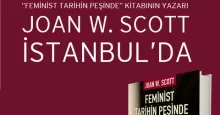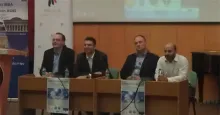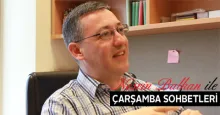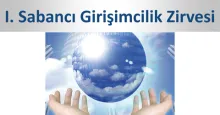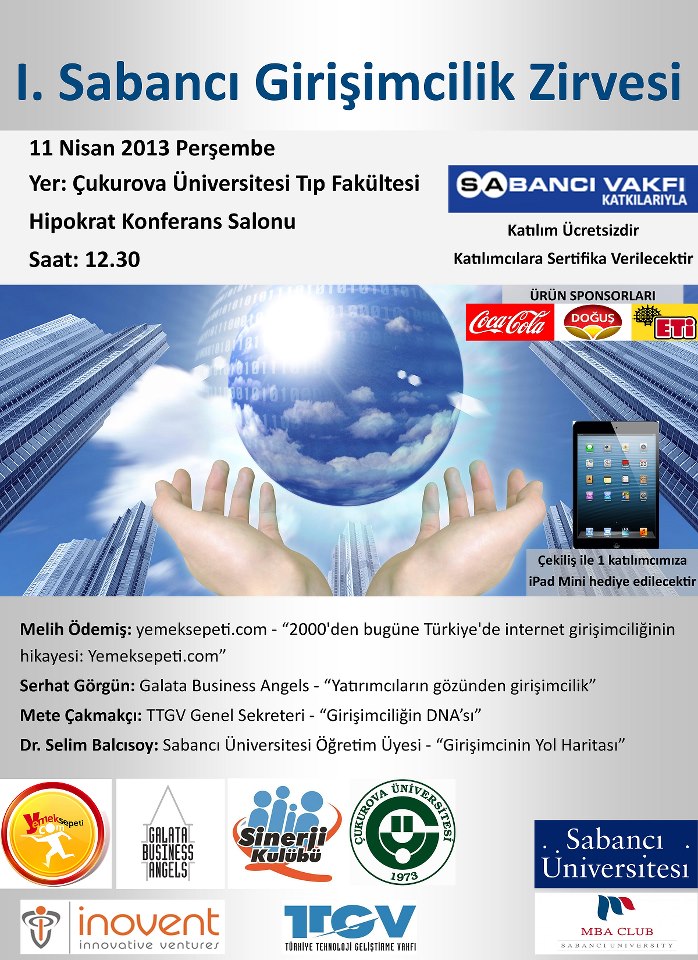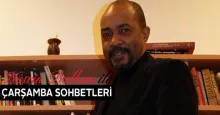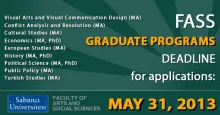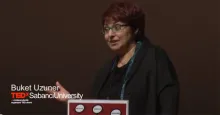Lanfranco Aceti: “I don’t believe in stereotypes. Sometimes, when I think that the popular belief is wrong, I do just the opposite specifically to prove it wrong.”

Lanfranco Aceti is a professor of modern art and digital culture at the Faculty of Arts and Social Sciences. As an artist, curator, academic and researcher, his work is known extensively throughout the world. He has had exhibitions at the Institute of Contemporary Art (ICA), and Tate Modern in London, the Venice Biennale, and the Museum of Modern Art. He is the director of the Kasa Galeri in our building in Karaköy, and the editor-in-chief of the Leonardo Electronic Almanac, an MIT publication. Finally, he is a visiting professor at the University of London Goldsmiths College. Doing so many things at once, Lanfranco managed to bring ISEA, the world’s largest electronic arts festival, to Istanbul and Turkey only 4 months after his arrival at Sabancı University.
We spoke with Lanfranco on how he prepared for ISEA2011 and his experiences in Italy and the UK.

Lanfranco, how long have you been in Turkey? What were your first impressions of Istanbul?
We came here four and a half years ago, in August 2008. Like every other tourist, we first stayed in Sultanahmet, but since we didn’t know what was expecting us once we moved to the campus, we decided to look for bedding and other stuff in Sultanahmet. This being a touristic place, we couldn’t, of course, and then we got into the Grand Bazaar and got lost. There we saw a shop selling traditional quilts, and the shop owner thankfully helped us. He gave us the stuff to put in the pillow, so I had a huge plastic bag in my hand. He even arranged for a car to take us from the Bazaar all the way to Tuzla, and came with us for the ride. There was some really cheerful music playing on the way; that was a great trip for me. It was my first time in Istanbul and we were traveling from the city center to the campus in a car. I had felt that the city was immense and there was simply no end to it. The city extends for great distances in every direction. People were very helpful, they would get out of their way and do their best. This used to be the case in Europe, but it’s changing recently. People are helpful and hardworking to boot. But there is so much bureaucracy that no matter how hard you work, the end result isn’t commensurable with the effort. If it weren’t for the bureaucracy, a lot more could be achieved for all this hard work.
Had you been in Turkey before working at Sabancı?
Yes, I came here first when I was 18.
Lanfranco, you are of Italian origin and you have Italian and British nationalities. You are an artist, a curator and an academic. You came to Sabancı as an academic, right?
Right.
As far as I know, you brought an important international event to Sabancı—you held the ISEA (Inter-Society for the Electronic Arts) “International Electronic Arts Symposium” in Istanbul. Can you talk about this?
When I decided to move to Istanbul, some of my academic friends thought it was exciting and that there were lots to be done in Istanbul. Others told me that I would be effectively killing my career. But I don’t believe in stereotypes. Sometimes, when I think that the popular belief is wrong, I do just the opposite specifically to prove it wrong.

So you like a good fight.
Absolutely. I have been swimming against the current for too long. When I moved here, I had plans about organizing ISEA2011. Meanwhile, the editor-in-chief of the Leonardo Electronic Almanac, an international MIT publication on arts, science and technology, was quitting and they needed a new editor. I wanted to do both, so I applied for both. We brought ISEA2011 to Istanbul, and I became the editor-in-chief of the Leonardo Electronic Almanac. ISEA2011 in Istanbul was the 17th event in the series. This year, the 19th event will take place in Sydney, but since some organizers have been involved in more than one event, there are 15 “ISEA Chairs” in the world at the moment. These people are art directors and conference chairs. The fact that there are 15 academics in the world who have organized ISEA shows what a large event it is. We had ISEA here in September 2011. It was difficult, but it was an important event for the university nevertheless. This led to a marked increase in how well Sabancı was known on an international level for its work on media, art and the relationship between art, science and technology. Many academics from University of Sydney to MIT, Sorbonne and Tokyo have now heard of Sabancı in this area. I have had extraordinary students during both the organization and event stages.

Özden Şahin, Deniz Cem Önduygu and Mehveş Çetinkaya worked day and night to make this a reality; if it weren’t for them, this wouldn’t have happened. Özden Şahin was the conference and program director. Deniz Cem Önduygu took care of all the design work, and Mehveş Çetinkaya, a Sabancı graduate who joined us in the last six months, organized the conference and exhibition. That made me understand that coming to Istanbul wasn’t a fatal blow to my career but the onset of wonderful opportunities.

And some excitement.
Definitely.
Difficulties, challenges, excitement, adrenaline…
Good food.
The food is good, there is a lot of excitement and not much routine.
Yes.
Once it was decided to have Sabancı organize ISEA2011 in Istanbul, there was a lot of preparation to do. I believe you had already planned what event would take place where. Then there were the negotiations with the city council and the ferry lines. How long did the preparations take?
Our application was accepted in the spring of 2009. I had arrived in the summer of 2008, and I started straight away. In other words, we had gotten ISEA2011 four months after I began working at Sabancı. This took a semester, but I knew what I wanted to do beforehand anyway.

You knew what you wanted to do, you came here knowing it, and you dove headfirst into the efforts four months after you arrived: you would have to work within foreign bureaucracy, talk to people whose culture you didn’t know, explain what you wanted to do to public authorities, negotiate with the city and ferry lines, convince them to support ISEA… How did all this come to pass?
The bureaucracy is difficult indeed, but our administrative associates, namely Viket Galimidi, Sumru Şatır, İnci Ceydeli and Tuğcan Başaran did everything in their power to take the bureaucratic load off of us. These people are the backbone of our faculty and it is thanks to them that everything runs smoothly. Outside the university, some things were easy but others were impossibly difficult. For example, we secured a sponsorship from İDO, the City Ferry Lines to be exact. They gave us two ferries and parts of the ISEA conference were held on board those ferries for two days, and we paid nothing for it!

They wouldn’t let you do this in many places of the world. Thanks to their generosity, this was one of the highlights of the event. We had disposal of the City Art Gallery and we did some of our public performances in the Taksim Square, which was also a great aspect of the event. But some museum directors and public authorities weren’t helpful. For instance, we couldn’t work with the Galata Mevlevihane Museum because the director was interested at first, but then they kind of let it fall. We were inviting artists from Australia, America and the Far East, and they had to know where the event would be held. They would set up their works according to the exhibition area plan, and we would set up the venue for them. That is why we decided that we couldn’t work with venues that would have us wait until the last moment.

Did you run into anything interesting during these efforts?
Yes, a museum director told us that things worked differently in Turkey, that conspiracies were always at work. He implied that some things, particularly very new and unconventional things couldn’t be done here. But I think just the opposite: we were very clear about what we wanted, we talked to people in all our openness and succeeded in getting what we wanted. And I told that museum director that it was because of people like him that young people couldn’t take the initiative, because they know they would be stopped.
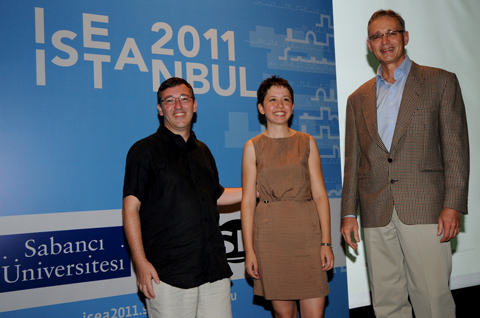
You ran into all kinds of people, naturally. You are always a smiling person but is there something specific that brings a smile to your face when you think back to those days?
During the preparations, Özden and I would leave campus on the earliest bus; we would have to get up at five to catch the bus at six, and come back to the campus on the last bus, at 11 in the evening. We worked in the city all day long and this went on for the entire week; we left on the earliest bus and returned on the latest. We needed a permit from the City to use Taksim Square for performances and other events. So we went to the Constabulary in Topkapı all the way from Tuzla for several weeks. Özden and I would have to be there very early in the morning because the Constabulary had appointment hours and if you missed them there would be throngs of people waiting. Istanbul is a huge city and when everyone has something to do at the Constabulary, it’s simply impossible to walk through the date. First time we were there, we noticed there was a canteen and a group of people –workers, constables– were having breakfast. We thought let’s get something to eat, and they gave us these huge sandwiches, full loaves of bread, for only like two or three lira. It was a lively and uplifting environment, so we made a point of having breakfast there every time we went. The chief constable or whoever it was that would sign the permit didn’t understand what we wanted to do. Özden explained it in Turkish but he didn’t appear to be listening. He was only convinced when he saw our permit to use the City’s own Cumhuriyet Art Gallery in Taksim Square. He later admitted that he wasn’t really interested in us until he saw that permit. Then we somehow found out that he liked table tennis. We were planning to bring in a couple of levitating robots that threw a ball at each other and played tennis from a university in Switzerland. We talked to him about this; he loved the idea and signed the permit.

So the chief constable’s love of tennis made your life easier.
In fact, when we told him that this was an art, science and technology event, he said he always wanted to be a scientist. He said he had awards from TÜBİTAK. But during all the time Özden and I were there, waiting, no one understood what we were there for; they were looking at us, wondering how come we had ended up there. We appeared very different to them and got a lot of attention.
You had a very small team to take care of such a large event. Except the four administrative associates at the faculty, there were only four of you in the field. How is it with other ISEA events?
The preceding event, ISEA2010, had been held in the Ruhr region, which was the European Capital of Culture at the time, and they had a team of 60 people. In our case, 1400 speakers and listeners took part in the event. We had a very small team to take care of an international organization of 1400 people from all around the world. We were even joking among ourselves, saying a Turk and an Italian did the job of 60 Germans.
To be continued…


